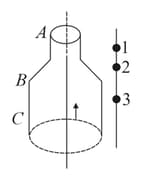Ampere’s Circuital Law and Its Application
Ampere’s Circuital Law and Its Application: Overview
This Topic covers sub-topics such as Ampere's Circuital Law, Magnetic Field Due to Infinitely Sheet Using Ampere's Law and, Magnetic Field Due to a Current Carrying Cylinder Using Ampere's Law
Important Questions on Ampere’s Circuital Law and Its Application
Current I is following along the path ABCD, along the four edges of the cube (figure-a) creates a magnetic field in the centre of the cube of . Find the magnetic field B created at the centre of the cube current I following along the path of the six edges ABCDHEA figure - b
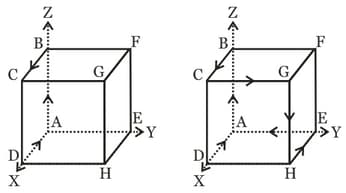
Two long conductors are arranged as shown above to form overlapping cylinders, each of radius r, whose centres are separated by a distance d. Current of density J flows into the plane of the page along the shaded part of one conductor and an equal current flows out of the plane of the page along the shaded portion of the other, as shown. What are the magnitude and direction of the magnetic field at point A ?
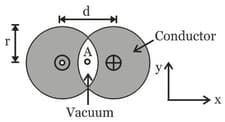
infinitely long thin wires each carrying current in the same direction, are in the plane in a gravity-free space. The central wire is along the -axis while the other two are along with If the central wire is displaced along the -direction by a small amount & released, the wire executes the simple harmonic motion. If the linear density of the wire is , find the frequency of oscillation.
A cylindrical conductor of radius carries a current along its length. The current density , however, is not uniform over the cross-section of the conductor but is a function of the radius according to , where is a constant. Then the expression for the magnetic field
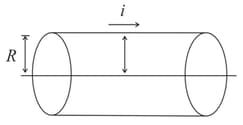
at
at
Six wires of current and cut the page perpendicularly at the points and respectively as shown in the figure. Find the value of integral around the circular path
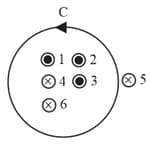
Ampere's law is analogous to
A toroid with thick windings of turns has inner and outer radii and respectively. If it carries certain steady current the variation of the magnetic field due to the toroid with radial distance is correctly graphed in
The figure shows a long coaxial cable in which a current flows down through the inner cylinder of radius and the same current flows back up through the outer cylinder of radius . The cylinders are insulated from each other and the current is uniformly distributed over the area of the cross-section in each cylinder. The strength of the magnetic field at a distance from the axis of the cable is

A cylindrical cavity of diameter a exists inside a cylinder of diameter as shown in the figure. Both the cylinder and the cavity are infinity long. A uniform current density flows along the length. If the magnitude of the magnetic field at the point is given by , then the value of is
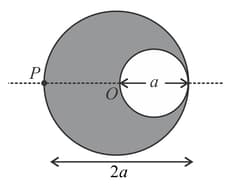
A long current carrying straight wire having current ampere is placed at the centre of an another current carrying loop having current ampere. Straight wire is perpendicular to the plane of the loop as shown in the figure. The torque (in ) acting on the loop about its center is Find the value of (Radius )
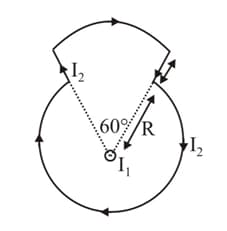
An infinite straight wire is passing through the centre of a circular loop of radius . The wire carries a current . The length of the wire makes an angle with the plane of the loop. The value is found , when evaluated along the loop. Calculate the value of .
Consider a long cylindrical wire carrying current along the axis of wire. The current is distributed non-uniformly on cross-section. The magnetic field inside the wire varies with distance from the axis as , where is a constant. The current density varies with distance as then the value of is (where is another constant).
Find the magnetic field created by a current carrying wire of current at a distance of from the wire in micro Telsa.
The two ends of non-conducting spring of force constant and unstretched length of are connected to the mid points of two straight parallel rods each of length . When current is passed through each rod in the same direction, the work done on the spring in is
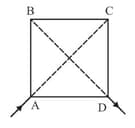
is a square loop made of a uniform conducting wire of same material and same cross sectional area. current enters the loop at and leaves at The magnetic field is:
The figure shows an Amperian path . Part is in the vertical plane , while part is in the horizontal plane . The direction of circulation along the path is shown by an arrow near points and . for this path according to Ampere's law will be
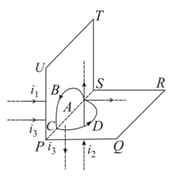
A long straight wire, carrying current I, is bent at its midpoint to form an angle of Magnitude of magnetic field induction at point , distant from point of bending (as shown in figure), is equal to:
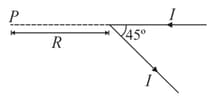
A current ampere flows along an infinitely long straight thin walled tube, then the magnetic induction at any point inside the tube is :
Switch is closed at At time suppose current through the ammeter is then the value of the line integral along the planar loop drawn in the space between the plates of the capacitor parallel to the plates is given as
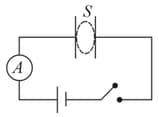
A long, straight, hollow conductor tube carrying a current has two sections and of unequal cross section joined by a conical section and are the points on a line parallel to the axis of the conductor. The magnetic fields at and have magnitude and
